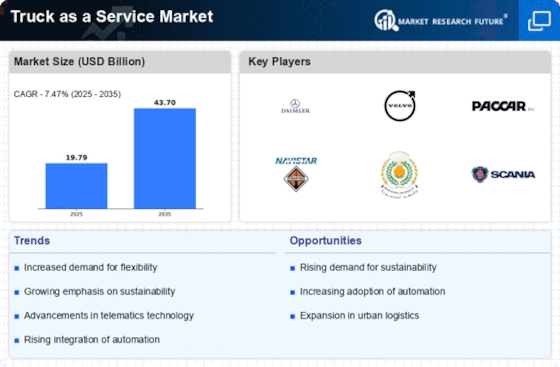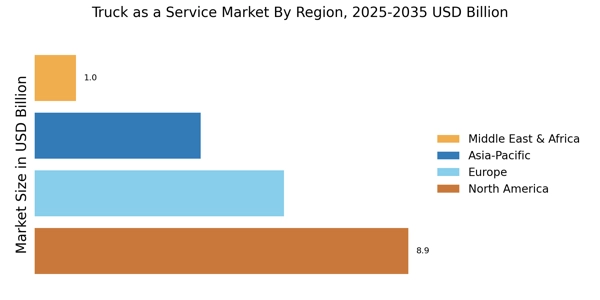Increased Focus on Sustainability
Sustainability is becoming a central theme within the Truck as a Service Market. Companies are increasingly prioritizing environmentally friendly practices, driven by regulatory pressures and consumer demand for greener solutions. The shift towards electric and hybrid trucks is indicative of this trend, as businesses seek to reduce their carbon footprints. Recent studies suggest that the adoption of sustainable logistics practices can lead to cost savings of up to 20% in fuel expenses. As organizations strive to meet sustainability goals, the Truck as a Service Market is likely to see a rise in demand for services that incorporate eco-friendly technologies and practices. This focus on sustainability not only enhances brand reputation but also aligns with broader societal goals of reducing environmental impact.
Growth of E-commerce and Last-Mile Delivery
The rapid growth of e-commerce is reshaping the logistics landscape, thereby impacting the Truck as a Service Market. As online shopping continues to gain traction, the demand for efficient last-mile delivery solutions is surging. Companies are increasingly turning to Truck as a Service Market models to meet the challenges posed by this shift in consumer behavior. Market analysis indicates that last-mile delivery services are expected to grow at a rate of 15% annually, driven by the need for speed and reliability in deliveries. This trend presents a significant opportunity for the Truck as a Service Market, as service providers can offer tailored solutions that address the unique requirements of e-commerce logistics, including flexible delivery options and enhanced tracking capabilities.
Advancements in Fleet Management Technologies
Technological advancements in fleet management are significantly influencing the Truck as a Service Market. Innovations such as real-time tracking, predictive maintenance, and data analytics are enhancing operational efficiency and reducing costs for logistics providers. The integration of Internet of Things (IoT) devices into trucks allows for better monitoring of vehicle performance and driver behavior, which can lead to improved safety and reduced downtime. Market data indicates that the fleet management software market is expected to reach USD 30 billion by 2026, reflecting a growing investment in technology that supports Truck as a Service Market models. These advancements not only streamline operations but also provide valuable insights that can drive strategic decision-making within the Truck as a Service Market.
Collaborative Business Models and Partnerships
The emergence of collaborative business models is transforming the Truck as a Service Market. Companies are increasingly forming partnerships to share resources and expertise, which can lead to enhanced service offerings and reduced operational costs. This trend is particularly evident in the logistics sector, where businesses are seeking to optimize their supply chains through collaboration. Data suggests that companies engaging in collaborative logistics can achieve cost reductions of up to 30%. As organizations recognize the benefits of shared resources, the Truck as a Service Market is likely to see a rise in joint ventures and strategic alliances that enhance service delivery and operational efficiency.
Rising Demand for Flexible Logistics Solutions
The Truck as a Service Market is experiencing a notable increase in demand for flexible logistics solutions. Businesses are increasingly seeking ways to optimize their supply chains, which has led to a shift towards service-based models. This trend is driven by the need for cost efficiency and adaptability in logistics operations. According to recent data, the logistics sector is projected to grow at a compound annual growth rate of approximately 7.5% over the next five years. This growth is likely to fuel the adoption of Truck as a Service Market models, as companies look to leverage external expertise and resources to enhance their operational efficiency. As a result, the Truck as a Service Market is positioned to benefit from this evolving landscape, providing tailored solutions that meet the diverse needs of businesses.

















